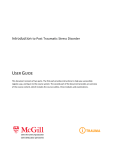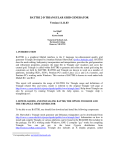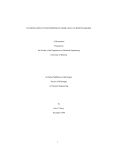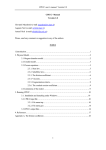Download ChE 260 - Department of Chemical, Biological and Pharmaceutical
Transcript
ChE260 – Fluid Flow Fall 2015 Otto H. York Department of Chemical, Biological & Pharmaceutical Engineering New Jersey Institute of Technology Lectures: Tuesday/Thursday 08:30-09:55 AM, Kupfrian Hall (KUPF) 105 Instructor: Dr. Ecevit Bilgili, Associate Professor Contact: York Building 234, 973.596.2998, [email protected] Office Hours: Tuesday 10:00-12:00 AM, Wednesday 08:30-9:30 AM in Tiernan Hall Rm. 373, (for other times, usually for extenuating circumstances, an appointment must be made by sending an e-mail to the instructor at least three days in advance) Teaching Assistant/Contact: Will be announced during the first week of classes, if assigned Course Description and Requirements ChE260 – Fluid Flow (3-0-3) This course considers the principles of molecular and turbulent transport of momentum, particularly as they apply to pressure drop calculations in piping systems, packed columns, and other flow devices. Flow around submerged objects is also considered. Prerequisites/Corequisites by Course: ChE 230 (prerequisite), as well as ChE 240 and Math 222 (corequisites). The student must satisfy the pre/corequisites for each course before registering. Please consult with your undergraduate adviser if you have any questions. Prerequisites/Corequisites by Topic: Calculus (prerequisite), Material Balances (prerequisite), Thermodynamics (prerequisite), Energy Balances (corequisite), Differential equations (corequisite). Course Objectives 1. Provide students with the knowledge to understand the basic principles of fluid mechanics and the tools needed to design complex flow systems, including packed and fluidized beds 2. Teach students how to develop mathematical representations (models) of physical phenomena and apply these models to solve engineering problems in fluid mechanics 3. Make students aware of the importance of safety aspects, energy conservation, and pollution prevention in designing fluid flow systems Learning Materials/Tools Textbooks: Required: Geankoplis, C. J., “Transport Processes and Separation Process Principles,” 4th Edition, Prentice Hall, Upper Saddle River, NJ, 2003. This book is available at NJIT’s bookstore. Strongly Recommended: Schaum's Mathematical Handbook of Formulas and Tables, M.R. Spiegel (with J. Liu), 2nd Ed., McGraw-Hill. Other editions/co-authors are acceptable. Other Learning Material: The class notes and PowerPoint presentations give a summary of the material, and have been posted on the web (Highlander Pipeline/My Courses/Fluid Flow). Please print them and bring them along with your book and calculator before coming to each lecture. You will take additional notes on them during the lectures. Required Software: MS Office 2007, Matlab, Adobe Reader. All software can be downloaded from NJIT IST webpage. Student Mall labs and ChE department PC lab have the software. Calculator: A high-end calculator TI-83, TI-84, or TI-84-SE is required. The instructor will give support for these models. You may use other calculator models, but the instructor will not give support for such models and you have to learn how to use the calculators on your own. In general, all students are asked to refer to user manual and web resources for these calculators. Course Outline Week Topic 1 Introduction, Fluids, Fluid Statics, Pressure, Differential (Shell) Momentum Balance on Static Fluids, Manometry, Head Molecular Transport, Newton’s Law of Viscosity, Shear Viscosity, Non-Newtonian Fluids, Gradients, Introduction to Laminar and Turbulent Flow, Reynolds Number Macroscopic Mass–Energy Balances, Continuity Equation, Mechanical Energy Balance, Bernoulli equation, Friction Losses in Mechanical Energy Balance Exam #1 Momentum Balance in Cylindrical Shell, Hagen-Poiseulle Equation, Momentum Balance in Falling Film, Navier-Stokes Equation, Velocity Distribution in Laminar and Turbulent Flow, Entry Length Design Equations for Laminar and Turbulent Flow in Pipes, Friction Factor, Mechanical Energy Losses in Pipes and Fittings Exam #2 Pumps and Compressors Measurement of Flow, Venturi, Orifices, Pitot Tube Macroscopic Momentum Balance, Forces on Pipes Flow Past Immersed Objects Flow in Packed Beds Final Exam 2 3–4 5 6–8 9 10 11 12 13 Important: It is conceivable that some changes in the above outline will take place, depending on the overall performance of the class and on the time actually required to cover the most important subjects. Assessment/Grading Quiz/HW — 15%, Exam #1 — 25%; Exam #2 — 25%; Final Exam — 35% Quiz/HW Assignments: Quizzes will NOT be announced. Only select HW will be graded. Once assigned, a HW is due the following week during class time unless otherwise indicated. Please use instructor’s office hours for HW related questions as well as other questions/inquiries. Student performance will be evaluated on an absolute scale and not relative to the performance of other students in class. Final letter grades will be awarded based on your weighted average score (see weighting above) and a table of average score–letter grade categories. These categories will be communicated via Highlander Pipeline. Attendance may affect your final grade as described under Policies/Norms. Important Dates (***Please mark on your calendar, see Timetable document for details***) Exam # 1 — Sept. 29; Exam # 2 — Oct. 29 Final Exam — Final exam period (Dec. 15-21, Day TBD by registrar) Cancelled Lectures — Sept. 08 (following Monday schedule), Oct. 06 (FDA Mtg.), Nov. 10 & 12 (AIChE Mtg.), Nov. 26 (Thanksgiving) Make-up Lectures — Sept. 12 (Sat. 9:00-10:30 AM), Oct. 10 (Sat. 9:00-10:30 AM), Nov. 14 (Sat. 9:00-12:00 AM), and Dec. 05 (Sat. 9:00-10:30 AM), all in KUPF105. Other make-up lectures for class cancellations due to inclement weather will be communicated separately. Last Day to Withdraw — Nov. 02 (M), no special permission to withdraw thereafter. Reading Days — Dec. 11&14 2 Policies, Norms, and Expectations Academic integrity/honesty is of paramount importance. The NJIT Honor Code will be upheld. Violations will be brought to the immediate attention of the Dean of Students. Rules and Expectations during the Lectures/Course Students are strongly recommended to attend ALL lectures. Attendance sheet must be signed at the beginning of the lecture; otherwise, the student is considered absent. Excluding immediately accountable, extenuating circumstances, more than 2 absences may negatively affect the grade if the weighted score is border-line between grades. More than 4 absences may lower the final grade to the adjacent letter grade. Students may get an F for more than 8 absences! Please come to the class before the lecture starts or at least ON TIME. Under no circumstances, students should distract their peers and the lecturer. Students are responsible for all information given in lectures (oral, written or handouts, posted notes), whether they are present or not during the lectures. No cell phone/laptop use, no video/audio recording, and no eating any time during the lecture. Make sure to pair with another student(s) to join in-class group activities (few minutes each). Students are expected to participate when asked by the instructor. Students are expected to behave, communicate, and interact with the instructor and peers with respect and dignity as a candidate, professional chemical engineer. Expectations: ATTEND all lectures, ASK questions, PARTICIPATE in group activities, SHOW UP during official office hours, DO homework, REVIEW/WORK ON the material of the previous lecture before next class, otherwise students will have difficulty to understand the lecture. Students are expected to MASTER the class/posted notes, take additional notes during the lectures, and read covered sections of Geankoplis. For success, students have to WORK OUT all derivations and examples in the notes on their own after each lecture. In case of questions, please see the instructor during Office Hours or raise questions in the class. Do not delay this to the exam week. Rules, Policies and Expectations about Course Materials, E-mails & Office Hours The instructor encourages all students to show up during the official office hours. Students must make their best attempt to contact the instructor during these hours. Course notes, HW assignment, HW solutions, etc. have been (will be) posted on the web (Highlander Pipeline/MyCourses/Fluid Flow). Critical announcements will be made through that system as well. You are required to visit the website on a daily basis to get recent homework assignments/solutions and other relevant announcements. Students are expected to bring the relevant notes, the book, and calculator to the class and to take additional supplementary notes in the class. E-mail is for quick questions, not for the solution of complex problems. Students are first encouraged to check MyCourses for information. Then, they should discuss the problems among their peers or study group. In the end, they are welcome to use the Office Hours fully. If a student misses the Office Hours for a serious reason, he/she may want to set up an appointment via e-mail at least 3 days in advance for alternate time depending on instructor’s availability at that time. Since the instructor cannot guarantee availability, it is best for students to contact the instructor during the Office Hours. The instructor reserves the right not to respond to all e-mails. Improperly written e-mails with lax attitude will not be replied. Also, e-mails will only be answered if it takes less than 5 min to respond and/or usefulness of the inquiry to the whole class. Instructororiginated information is communicated via e-mail or posted on Pipeline (check daily). 3 Policies and Expectations about Exams/Grades A letter grade is based on the weighted average score, a table of average score-letter grade categories, and possibly the attendance record. Letter grade will be assigned automatically by an Excel code (no emotions attached) in view of the attendance record. The assigned letter grade is FINAL without subject to negotiation! Students have to plan, study and do well in exams/HW if they want to get a good grade in this class. Instructor will NOT change letter grades to accommodate any special circumstances. The student will get the letter grade he/she deserves. Students can dispute the exam scores within a week following the announcement of the score. Students cannot dispute their prior exams or HWs after one week or at the end of the semester! After first review of the dispute, if the score is not modified, but the student is unconvinced and asks for an additional review, then he/she assumes the possibility of instructor reviewing the whole exam paper and removing points as well as giving points. Students may be asked to return their graded exam papers within a week. No extra credit will be allowed (no need to ask) under any circumstances. Exams are open notes and open books. Students are required to bring notes, the required textbook, any other books on Fluid Mechanics, a Mathematics Handbook and/or comprehensive Advanced Mathematics/Diff. Eqs. Book(s), Math Review Document, and a high-end calculator. No cell phones (to be turned off), Ipads, laptops, etc. can be used during the exam. Students have to write legibly while showing all work; otherwise, loss of points is likely. If two solutions are given for a problem including the correct and incorrect ones, the student gets 0 points. Please erase or cross out the incorrect solution. Students get 0 for no-show to exams. Make-up exams may only be given under extreme circumstances (e.g., major close-family emergency, serious accident or acute medical problem) at the sole discretion of the instructor. Students bear the responsibility of due proof and documentation of the circumstances. It is the student’s responsibility to inform the instructor or Dean of Students (preferred) ASAP. Read the Study Guide to be posted before each exam and attend the Review Session (if there is one). Some exam questions can be of multiple-choice type or of assay type requiring verbal explanations, while others will be derivation type with symbolic manipulation or pure calculation type requiring calculators. Show all work, otherwise no partial credit means you cannot simply skip important intermediate steps during a calculation/derivation. You will lose significant points even if the final answer is correct. Policies and Expectations about Homework Only select HW will be graded. Once assigned, a HW is due the following week during class time unless otherwise indicated. Solved problem sets have already been posted. You are strongly recommended to go over these solved problems as they will help you to solve HW problems that will be posted during the semester and prepare you for the Quiz/Exam. You are allowed to discuss HW problems with peer students, but cannot copy or use the solution directly. Late assignments will get 0 independent of the circumstances. Make sure you submit the HW at the beginning of the lecture preferably. If you come late to class, do NOT attempt to submit the HW and interrupt the lecture. You are allowed to submit HW after the lecture. No electronic submission accepted. Homework and exam papers must be written legibly in an organized, structured fashion. Students are responsible for potential loss of points due to sloppy, unclear, or illegible work on the papers. 4 Expectations for the Use of Mathematics and Calculators Mathematics is the language of engineers and the course will rely on some background in Calculus and Differential Equations. You are required to read the “Math Review” document and improve on the gap areas. Keep a Math Handbook such as Schaum’s Mathematical Handbook handy for study and exams. While going through the course material and solving quantitative and theoretical problems, try to relate to the math in the “Math Review” and Math Handbook. In exams, students are required to use high-end calculators for solution of a non-linear equation, linear regression, and spread-sheet calculations. There are examples that make use of TI-83-83-84+SE calculators in the course material. The instructor also provides resources in the Pipeline, and you have to consult with the user manual and web sources of your specific calculator model. Students will lose significant points if they are unable to solve a first-order ordinary differential equation (ODE), linear homogeneous second-order ODE with constant coefficients, to integrate/differentiate a function analytically, and to use their calculators for the aforementioned tasks. So, please consider these math-based expectations seriously. Toward obtaining analytical solutions, you should consult with your Math Handbook, Math Review Document, Calculus Textbook, and a Differential Equations Textbook. For numerical problems, you will use your calculator. Reference Books Bird, R. B., Stewart, W. E., and Lightfoot, E. N., “Transport Phenomena,” 2nd Edition, John Wiley & Sons, New York, 2001. Brodkey, R. S., and Hershey, H. C., “Transport Phenomena—A Unified Approach,” McGraw-Hill, New York, 1988. Denn, M. M. “Process Fluid Mechanics,” Prentice Hall, Englewood Cliffs, NJ, 1980. Felder, R.M. and Rousseau, R.W., “Elementary Principles of Chemical Processes,”2nd Ed., Wiley. McCabe, W.L., Smith, J.C., and Harriott, P., “Unit Operations of Chemical Engineering,” McGraw-Hill. Middleman, S., “An Introduction to Fluid Dynamics,” John Wiley & Sons, New York,1998. Perry, R. H., Green D. W., and, Maloney, J. O. (Editors), “Perry’s Chemical Engineers’ Handbook,” McGraw-Hill, New York, 1997. 5










